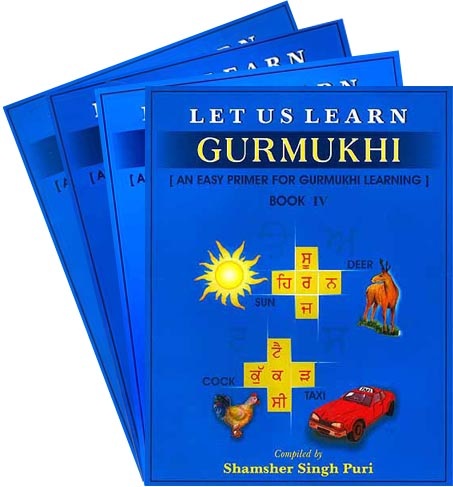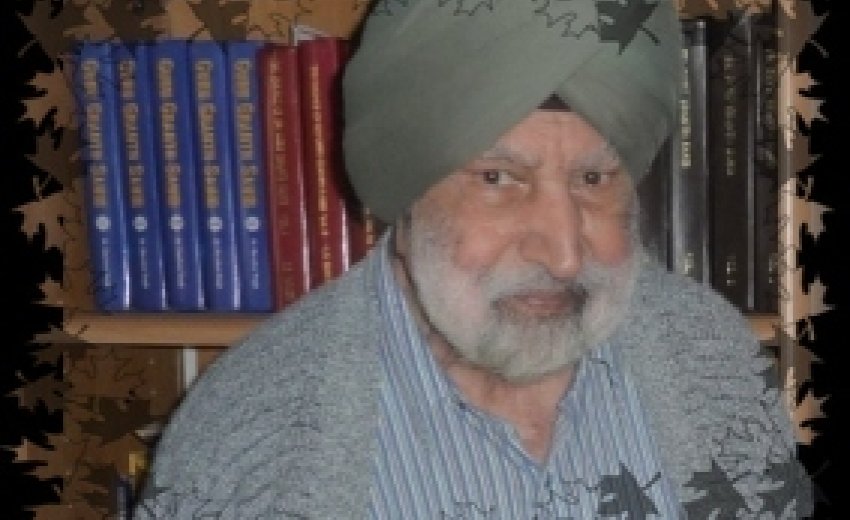A Sikh Scholar: Sardar Shamsher Singh Puri
[19th Jan 1926 to 30th Dec 2011]
On December 30th 2011, Sikh community lost one of their committed citizen and an erudite scholar, who lived a humble life and dedicatedly worked to live, preserve and promote Sikh heritage and philosophy by exemplifying through his life and sharing his experiences about the faith through books and articles.
Sardar Shamsher Singh Puri, was a personification of Chardikala - High Spirits, to many of us. His modest and pleasing personality, his genuine interest and care for sangat members, was reflective of his high spiritual quotient. Few days before his last journey, I went to see him in the ICU, where he was recovering symptoms of Guillan - Barre Syndrome. On seeing me, he uttered few words which initially I could not comprehend, and then after few repetitions, his wife Dalip Kaur jee, clarified to me that he is enquiring about your new born son and saying 'Where are my Ladoos'. I was in tears, and amazed to see the state of positive spirits ingrained in him. Myself and many other sangat members used to seek advises on personal dilemmas of life and social issues from his enriched experiential wisdom accumulated over the period of eighty-six years.
Son of late Sardar Sant Singh Puri and Sardarni Nehal Kaur, Shamsher Singh Puri was born on 19th Jan 1926 in the village, Dhamial near Rawalpindi, now a part of Pakistan. His Grandfather was a well known Physician and Surgeon, Dr. Surjan Singh, at Quetta and for his meritorious services was awarded title of Rai Bhadhar. As per 'Puri' family records, one of his ancestor Bhai Sukhan jee, was a very devout disciple of Guru Ram Das jee and was blessed with a Manji (Preaching center) to share and spread the wisdom of Guru Sahibaans. Later Bhai Sukhan's descendants, Rucha Ram and Bhai Anar Singh jee served Guru Gobind Singh at Anandpur Sahib. On their request Guru jee blessed them with Guru jee's and Mata jee's Kharavaan (shoes), which are presently preserved at Delhi, India. It was Sardar Shamsher Singh Puri's love for Gurbani and Sikhi, which kept alive the tradition of sharing the Gurbani's message by writing numerous books, articles and Sikhi related literature.
Sardar Shamsher Singh Puri, had a long professional career in civil and structural engineering, who after working 27 years in India on construction projects like Bhakra Dam, migrated to the U.S.A in 1974. He worked on various construction projects for Army bases in Florida and for construction of Hartfield-Jackson Airport and MARTA subway in Atlanta, Georgia, before retiring in early 90s. He is survived by his wife Dalip Kaur, whom he lovingly called 'Deep', two sons Manvinderpal Singh and Preetinder Singh and a daughter Ishpinder Kaur, daughter-in-law Gurminder Kaur, son-in-law Rajpal Singh, and four grand-childrens. His family was his strength and each member supported his endeavoring efforts to write voluminous books.
 Sardar Shamsher Singh Puri dedicated much part of his retired life into the preservation of Gurmukhi language and authoring faith based books and articles. One of his major contributions to Sikh community is the Punjabi School Primers (Let Us Learn Gurmukhi), in four volumes which are being used to teach Gurmukhi script to kids in many Gurudwara Schools across the USA, U.K, Canada and many other countries. He shared his exploration and interpretation of Japjee Sahib, in a book - Essence of Jap jee Sahib. In this book's foreword, one of his long time friend and admirer of his writings, Aju Advani wrote that, "this interpretation introduces the reader to the background of Japji which provides a very interesting and comprehensive picture. Next, he presents the broader context necessary to understand Japji".
Sardar Shamsher Singh Puri dedicated much part of his retired life into the preservation of Gurmukhi language and authoring faith based books and articles. One of his major contributions to Sikh community is the Punjabi School Primers (Let Us Learn Gurmukhi), in four volumes which are being used to teach Gurmukhi script to kids in many Gurudwara Schools across the USA, U.K, Canada and many other countries. He shared his exploration and interpretation of Japjee Sahib, in a book - Essence of Jap jee Sahib. In this book's foreword, one of his long time friend and admirer of his writings, Aju Advani wrote that, "this interpretation introduces the reader to the background of Japji which provides a very interesting and comprehensive picture. Next, he presents the broader context necessary to understand Japji".
Another unique and classical literary work by Puri Sahib is translations of Bhai Gurdas jee di Varaan and Kabitt Swayye. Besides literal meaning of the Pauris, he also provided the 'Essence', which greatly helps the reader to comprehend the message of each Pauri. He was inspired by Bhai (Dr.) Harbans Lal ji and Dr. Kulwant Singh Khokhar to accomplish this enormous task.
Writing books was his passion and an essential driver for his life. He wrote many books on theology and historical aspects of Sikhi, like Handbook of Sikh Theology, Prayer - Sikhism , Bhagat-Saints of Guru Granth Sahib, Spiritual Sayings, Sikh Philosophy and Spiritual Life, all published by Singh Brothers Amritsar. He also projected his interpretation of Sikhi perspective on various aspects of life and social challenges. We wrote books like Happy Marriage -the Sikh Way, Ills of Today's Fast Life - The Sikh Therapies, Influence of thought on Body and Mind - The Sikh Perspective, and Ab To Jag Musafir Piare in Punjabi.
Puri Sahib, often used to quantify his life experiences and profound observations in short column article named - Moments of Reflection. His quotes were simple, realistic and inspiring to the readers. Though on one hand he explored faith through literary encounters, but he had firm belief in the soul-centric search and realization of Divine, as reflected in one of his quotes "You will not find GOD philosophically, Seek him as the answer to all needs of your Soul". Another quote on social relationship, "Friendship is like a book. It takes a few seconds to burn it, but takes years to write it".
To many of us in Atlanta, he was a father figure, who guided us in our time of distress and in our need for direction about complexities of personal life and social issues. He was very much respected within Sikh and Indian communities. He actively participated in the establishment and functioning of local Gurudwara institutions, donated books to libraries and distributed Gurmukhi primers to Punjabi schools in all the Gurudwaras. He helped and participated in various Sikh youth developmental programs and projects. He founded Academy of Sikh Studies, to promote and publish Sikhi literature.
Even at age of 85, he lived independently till the end with his wife, Dalip Puri in their house in Lilburn, GA. He wanted the independence to keep up with his work, his relationships and just not feel dependent on anyone, even on his children. He bought the groceries, got his medicines, his last oil change and drove to the last trip to the Gurudwara all by himself till the end.
By the end of his life, he lived by three Mantras:
- - When it was time to make a decision or accept an outcome, he always went with "Jo Ohda Hukum Hai".
- - When he suffered physically with aging, he submitted to that, "Its part of life"
- - For all other times when was asked how is he doing, he use to say, "Waheguru Da Shukar Hai".
Shamsher Singh Puri penned his last article - 'A View about Life and Death' on November 24th, in which he shared his perspective on death and the way he will prefer to encounter it. He writes, "There is nothing unique about Death. Death comes to all who are born. So we need not pull long face when death comes. Of course it is human nature, to grieve for someone you have lost but that is no reason to create big fuss, wailing and screaming. Nor is there any need to have elaborate rituals. Death is order of nature when your time comes, die with DIGNITY. One should have right to say GOOD BYE and should be legitimate to finish his life. I wish to be cremated simply and to remember me, only prayers should be said not for me but for peace of those who gave all love during my life" - Sardar Shamsher Singh Puri, dt Nov 24th 2011.
His view on encounter with death in this article reflects a high-spirited, noble-soul, gracefully contended, Divine-submitting personality. Many of us will miss his presence around us, but he will be remembered by his family as a loving and affectionate member of family, and his work will be held in highest esteem for his contribution to Sikh literature, for years and decades to come.
Waheguru jee Ka Khalsa, Waheguru jee Ki Fateh.
An Obituary by : Hardeep Singh and Grace Puri (daughter-in-law of Late Shamsher Singh Puri)
